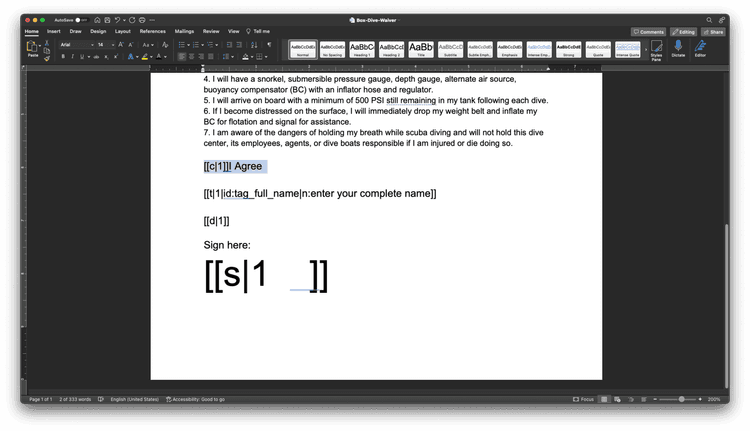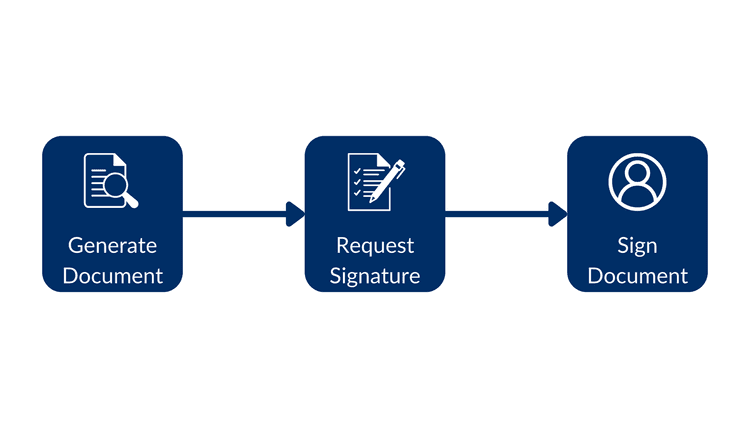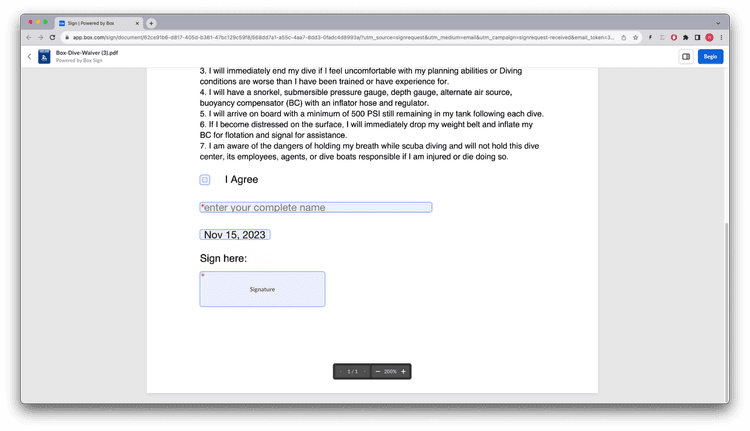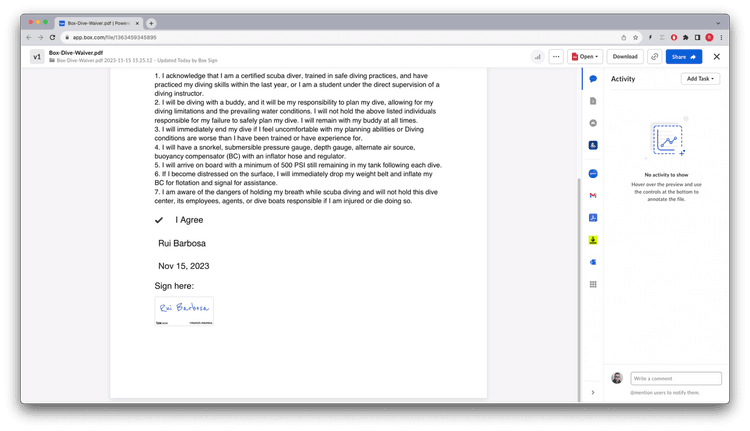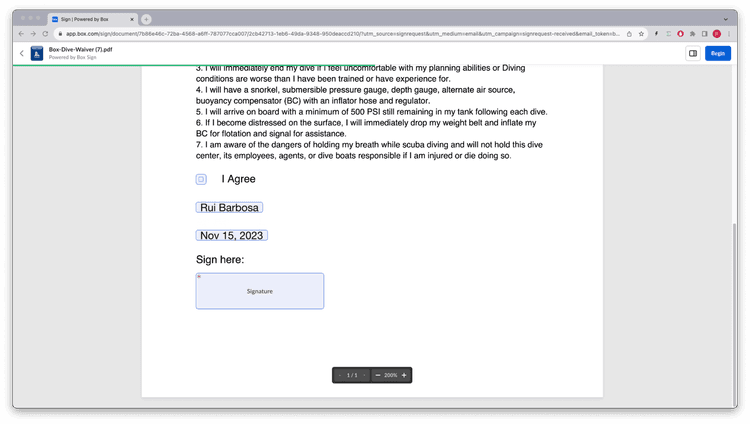Signing structured docs
Signing structured docs
A structured document in the context of Box Sign is a document that includes specific tags that can be recognized by the Box Sign API. These tags are used to place the signature properties associated with a specific signer in the document, such as name, date, and signature.
This allows your app to handle a dynamic generated document that is ready to be signed, which has a couple of advantages:
-
The document can be dynamically generated, and the signature properties can be added to the document before creating the signature request, effectively bypassing the document preparation step.
-
The document format can be handled outside of Box Sign templates, allowing higher flexibility and integration with external document management systems.
Anatomy of a structured document
Here is an example of a structured document, showing the formatting used to place tags in a Microsoft Word document:
In the sample above [[c|1]] means a checkbox assigned to signer 1, and [[s| 1]] means a signature pad assigned to signer 1. Notice how the signature pad
is using font size 48 to reserve space vertically for the signature.
The [[t|1|id:tag_full_name|n:enter your complete name]] means a name tag
assigned to signer 1, with the label enter your complete name, and using an
id of tag_full_name.
Check out this document for a complete description of all the tags available.
Setting the tags to the same color as the background will make them
invisible, but they will still be there.
The number in the tags refer to the signer number, not the signing order, so
[[c|1]] is the checkbox for signer 1, [[c|2]] is the checkbox for signer 2,
and so on.
Tag 0 is reserved for the sender, and always exists. So even if the sender does not need to input any data into the document, the other signers must start with 1.
Create a signature request from a structured document
This is the same as creating a signature request from an unstructured document.
At minimum, you will need to specify the document, the receiving folder and
the email of the signer.
Since the structured document already contains the signature properties details and location, you can bypass the document preparation.
This is how the flow would look like, from the generated document, create the signature request and finally sign the document:
Consider this method:
curl --location 'https://api.box.com/2.0/sign_requests' \
--header 'Content-Type: application/json' \
--header 'Authorization: Bearer nQ...xY' \
--data-raw '{
"source_files": [
{
"type": "file",
"id": "1363379762284"
}
],
"parent_folder": {
"id": "234102987614",
"type": "folder"
},
"signers": [
{
"email": "signer@example.com",
"role": "signer"
}
]
}'
def create_sign_request_structured(
client: Client, file_id: str, signer_email: str
) -> SignRequest:
"""Create a sign request with structured data"""
# Sign request params
source_file = FileBase(id=file_id, type=FileBaseTypeField.FILE)
parent_folder = FolderMini(
id=SIGN_DOCS_FOLDER, type=FolderBaseTypeField.FOLDER
)
signer = SignRequestCreateSigner(signer_email)
# Create a sign request
sign_request = client.sign_requests.create_sign_request(
signers=[signer],
parent_folder=parent_folder,
source_files=[source_file],
)
return sign_request
def main():
...
# Create a sign request with structured data
sign_request = create_sign_request_structured(
client, STRUCTURED_DOC, SIGNER_A
)
check_sign_request(sign_request)
Resulting in (simplified):
{
"is_document_preparation_needed": false,
"signers": [
{
"email": "sender@example.com",
"role": "final_copy_reader",
},
{
"email": "signer@example.com",
"role": "signer",
}
],
"id": "28199d6c-4662-471e-8426-4cbba9affcf1",
"source_files": [
{
"id": "1363379762284",
"type": "file",
"name": "Box-Dive-Waiver.docx",
}
],
"parent_folder": {
"id": "234102987614",
"type": "folder",
"name": "signed docs"
},
"name": "Box-Dive-Waiver.pdf",
"type": "sign-request",
"status": "converting",
"sign_files": {
"files": [
{
"id": "1393138856442",
"type": "file",
"name": "Box-Dive-Waiver.pdf",
}
],
},
}
Simple sign request: 6878e048-e9bd-4fb1-88c6-8e502783e8d0
Status: converting
Signers: 2
final_copy_reader: sender@example.com
signer: signer@example.com
Prepare url: None
If you go to the signer email inbox, open the email from Box Sign, click the Review Document button, you'll see the document with the signature properties in place:
After completing the process the signed document looks like this:
Pre-populate the signature attributes
If you have an external id in the document tags you can use it to pre-populate
their values. For example, you can use the tag_full_name to pre-populate the
name of the signer.
See this method:
curl --location 'https://api.box.com/2.0/sign_requests' \
--header 'Content-Type: application/json' \
--header 'Authorization: Bearer nQ...xY' \
--data-raw '{
"prefill_tags": [
{
"document_tag_id": "tag_full_name",
"text_value": "Signer A"
}
],
"source_files": [
{
"type": "file",
"id": "1363379762284"
}
],
"parent_folder": {
"id": "234102987614",
"type": "folder"
},
"signers": [
{
"email": "signer@example.com",
"role": "signer"
}
]
}'
def create_sign_request_structured_with_prefill(
client: Client, file_id: str, signer_name, signer_email: str
) -> SignRequest:
"""Create a sign request with structured data"""
# Sign request params
source_file = FileBase(id=file_id, type=FileBaseTypeField.FILE)
parent_folder = FolderMini(
id=SIGN_DOCS_FOLDER, type=FolderBaseTypeField.FOLDER
)
signer = SignRequestCreateSigner(signer_email)
# tags
tag_full_name = SignRequestPrefillTag(
document_tag_id="tag_full_name",
text_value=signer_name,
)
# Create a sign request
sign_request = client.sign_requests.create_sign_request(
signers=[signer],
parent_folder=parent_folder,
source_files=[source_file],
prefill_tags=[tag_full_name],
)
return sign_request
def main():
...
# Create a sign request with name pre populate
sign_request_pre_pop = create_sign_request_structured_with_prefill(
client, STRUCTURED_DOC, "Signer A", SIGNER_A
)
check_sign_request(sign_request_pre_pop)
Resulting in (simplified):
{
"is_document_preparation_needed": false,
"redirect_url": null,
"declined_redirect_url": null,
"are_text_signatures_enabled": true,
"signature_color": null,
"is_phone_verification_required_to_view": false,
"email_subject": null,
"email_message": null,
"are_reminders_enabled": false,
"signers": [
{
"email": "sender@example.com",
"role": "final_copy_reader",
},
{
"email": "signer@example.com",
"role": "signer",
}
],
"id": "11ecebc0-a2b2-4c14-a892-3f56333cc4fa",
"prefill_tags": [
{
"document_tag_id": "tag_full_name",
"text_value": "Signer A",
}
],
"source_files": [
{
"id": "1363379762284",
"type": "file",
"name": "Box-Dive-Waiver.docx",
}
],
"parent_folder": {
"id": "234102987614",
"type": "folder",
"name": "signed docs"
},
"name": "Box-Dive-Waiver (1).pdf",
"type": "sign-request",
"status": "converting",
"sign_files": {
"files": [
{
"id": "1393142670032",
"type": "file",
"name": "Box-Dive-Waiver (1).pdf",
}
],
},
}
Simple sign request: 7b86e46c-72ba-4568-a6ff-787077cca007
Status: converting
Signers: 2
final_copy_reader: sender@example.com
signer: signer@example.com
Prepare url: None
The document now has the name pre-populated:
Extract information from a signed document
Let's say you want to extract the name of the signer and the other properties from the signed document. This is useful if you need to tie the information from the signature request back into your systems.
Let's create a method to extract the information from the signed request:
curl --location 'https://api.box.com/2.0/sign_requests/
11ecebc0-a2b2-4c14-a892-3f56333cc4fa' \
--header 'Authorization: Bearer nQ...xY'
def check_sign_request_by_id(client: Client, sign_request_id: str):
"""Check sign request by id"""
sign_request = client.sign_requests.get_sign_request_by_id(sign_request_id)
print(f"\nSimple sign request: {sign_request.id}")
print(f" Status: {sign_request.status.value}")
print(f" Signers: {len(sign_request.signers)}")
for signer in sign_request.signers:
print(f" {signer.role.value}: {signer.email}")
for input in signer.inputs:
content_type = input.content_type
value = None
if content_type == SignRequestSignerInputTypeField.CHECKBOX:
value = input.checkbox_value
elif content_type == SignRequestSignerInputTypeField.TEXT:
value = input.text_value
elif content_type == SignRequestSignerInputTypeField.DATE:
value = input.date_value
print(
f" {input.type.value}: {value if value is not None else '<other>'}"
)
print(f" Prepare url: {sign_request.prepare_url}")
def main():
...
# Latest sign request
LATEST_SIGN_REQUEST = "7b86e46c-72ba-4568-a6ff-787077cca007"
check_sign_request_by_id(client, LATEST_SIGN_REQUEST)
Resulting in (simplified):
{
"signers": [
{
"email": "sender@example.com",
"role": "final_copy_reader",
},
{
"email": "signer@example.com",
"role": "signer",
"signer_decision": {
"type": "signed",
"finalized_at": "2023-12-19T14:53:10.547Z",
},
"inputs": [
{
"document_tag_id": null,
"checkbox_value": true,
"type": "checkbox",
"content_type": "checkbox",
},
{
"document_tag_id": "tag_full_name",
"text_value": "Signer A",
"type": "text",
"content_type": "text",
},
{
"document_tag_id": null,
"text_value": "Dec 19, 2023",
"date_value": "2023-12-19",
"type": "date",
"content_type": "date",
},
{
"document_tag_id": null,
"type": "signature",
"content_type": "signature",
}
],
}
],
"id": "11ecebc0-a2b2-4c14-a892-3f56333cc4fa",
"prefill_tags": [
{
"document_tag_id": "tag_full_name",
"text_value": "Signer A",
}
],
"source_files": [
{
"id": "1363379762284",
"type": "file",
"name": "Box-Dive-Waiver.docx",
}
],
"parent_folder": {
"id": "234102987614",
"type": "folder",
"name": "signed docs"
},
"name": "Box-Dive-Waiver (1).pdf",
"type": "sign-request",
"signing_log": {
"id": "1393140642252",
"type": "file",
"name": "Box-Dive-Waiver (1) Signing Log.pdf",
},
"status": "signed",
"sign_files": {
"files": [
{
"id": "1393142670032",
"type": "file",
"name": "Box-Dive-Waiver (1).pdf",
}
],
},
}
Simple sign request: 7b86e46c-72ba-4568-a6ff-787077cca007
Status: signed
Signers: 2
final_copy_reader: sender@example.com
signer: signer@example.com
checkbox: True
text: Rui Barbosa
date: 2023-11-15
signature: <other>
Prepare url: None
Summary
Structured documents are a great way to integrate with external document management systems, creating dynamic documents that are ready for signature.
If your document signature requirements have a lot of options, you can pre-populate these from another data source and save the user's time, but remember that the user who owns these properties can always change them.
After the document is signed you can extract the information from the signature request, which is useful if you need to tie it back into your systems.
